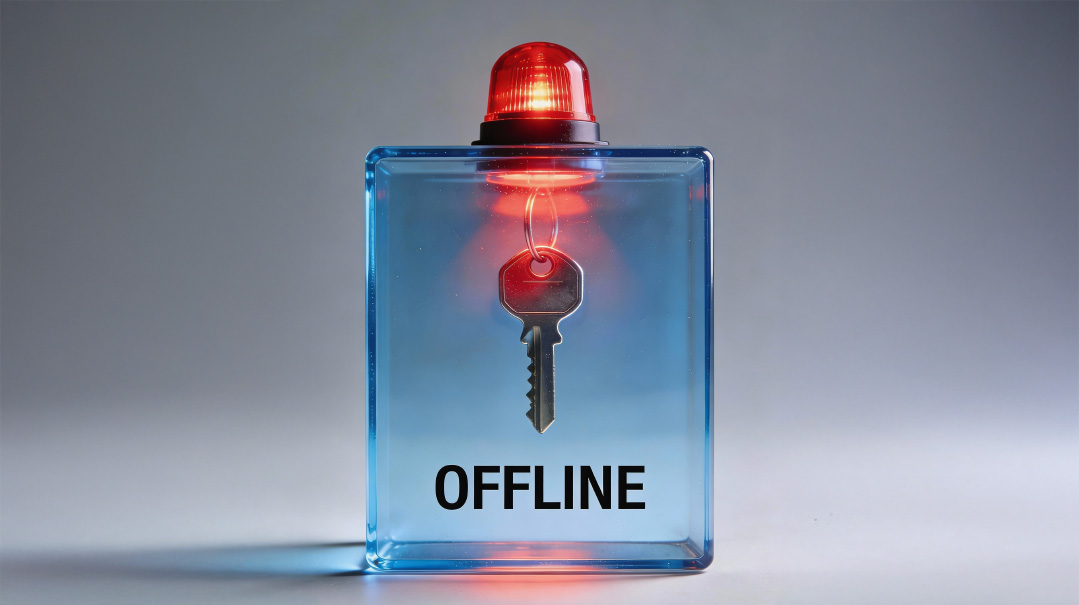Washed Out
| March 25, 2025Who was undercutting the high-end, professional service of my pre-Pesach car wash business?

Moe: Your cheap rates are driving our businesses to the ground
Yechiel: I’m servicing the community at rates they can afford
Moe
The delivery would arrive tomorrow.
I sighed in relief and put my phone down. The air smelled like bleach — Tali was in full swing with the Pesach cleaning, ably aided by Claudia. Sometimes it felt like Pesach kind of happened without me. While I used to feel bad about it, I have come to terms with the fact that it comes with the territory of running a business on Erev Pesach.
An email came in; it was from the insurance company. Great. I was still waiting to hear back from the clients, though. I’d emailed all our regular customers with the yearly We’re back email, and wanted to confirm contracts and start scheduling the jobs.
“You think we can turn over the kitchen on Motzaei Shabbos? I have the grocery order coming on Sunday,” Tali asked me.
Grocery order, wow. Produce and packaged goods, almond flour and grape juice and lots and lots and lots of potatoes.
Lots of money, too. That’s Pesach for you.
Well, that was why I was dealing with orders of my own, for things like car wash and shampoo, leather cleaner, microfiber rags, and several new large pieces of equipment to replace anything that wasn’t in great condition after last year.
“Yeah, should be fine,” I told Tali, but my mind was wandering. I’d hired several bochurim to do the actual car washing, but had I hired enough? Some of the guys who usually took the job hadn’t gotten back to me yet. Maybe I should call again.
“…Moe?”
I spaced back in. “Sorry, what were you saying?”
Tali sighed. “Never mind. You do your thing.”
I watched her retreating back. I felt bad that I wasn’t able to be more helpful around the house during Nissan — she was working so hard — but we’d made this choice, and the car wash service I ran in the run-up to Pesach was a major source of income for us. It covered our Yom Tov expenses, and then some.
It was important, it worked well, and the extra hours of Claudia’s help certainly didn’t hurt.
My phone started buzzing. Back to work.
IT’S
been what, ten years, since I jumped on the pre-Pesach car cleaning services bandwagon. A couple of my friends did it too; there was plenty of business to go around. Many large businesses hired companies like ours to clean their employees’ cars as a pre-Pesach bonus.
Back in the day, as a kid, I’d vacuumed neighbors’ cars for a few extra dollars. It wasn’t like that now — running an operation like this was big. Sourcing and ordering high quality equipment and products. Renting the commercial-grade pressure washers and vacuums. Paying a large crew of bochurim for the cleaning work. Securing insurance that would cover any accidental damages — a scratch on a brand-new Tesla could cost a small fortune without coverage.
I think a lot of people remember the five-bucks-a-car days, though, because at the beginning, I had a lot of pushback about our pricing. I remember several potential clients falling through because they insisted I was “overcharging,” but they had no idea about the backend costs of running such a business.
We weren’t just running a vacuum cleaner over the seats, we were offering a high-end, professional service. I was paying a couple dozen bochurim, I was paying for insurance and equipment, and this was my parnassah, too. The price was the price.
Eventually the dust settled, once people realized that all the companies were charging similar prices — which was what it cost to cover the expenses and keep the business sustainable. And they also saw that we offered high quality work and an efficient system. The clients were happy because they got quick and excellent service, the bochurim were happy to have bein hazmanim jobs each year, and I was happy to provide a great service while bringing in much-needed income.
All good, right?
Until it wasn’t.
E
very year, there are bochurim who move on — they worked for a few years, they have other things to do, they’re at a different stage now. So when Yechiel Halpert and a couple of his friends declined to join this year, I didn’t really think much about it, even though he was one of the guys who had worked for me consistently for several years already.
What did give me pause was when one of my longstanding clients told me he wouldn’t need our services this year, and another two didn’t reply to my email.
And then there were the cancellations, the almost-for-sures who backed out at the last minute….
“I’m just curious,” I asked, when it happened for the sixth time. I hoped my voice sounded casual. “You decided not to do the car washing thing for your employees this year?”
I half-expected to hear something regretful about budget cuts and leaving the bonuses for a better year. But instead, he hemmed and hawed, and then stammered something about getting a better deal, a fraction of the price.
What?
Who in the world was offering such a low price for a premium service?
And was this the reason behind the sudden, strange radio silence from so many former clients?
I
called my friend Motti. He ran a fairly successful business, and he could get answers for me easily.
“Do me a favor,” I said. “Dig around, ask a few of these guys who they’re using for their car cleaning this year. They’ll assume you’re asking for yourself, and they might give you some information.”
Later that day, Motti texted me a name.
Yechiel Halpert, he’s offering rock-bottom pricing for full pre-Pesach detailing service.
Yechiel Halpert? The bochur — how old was he, 18 or something? — who’d worked for me for a few years?
What was he playing at? Opening a business of his own was fair enough, but charging ridiculously low rates to take all my clients away — of course, he knew them, he’d done the cleaning for them all the past few years.
And then what, he’d steadily go up in price, but keep my clients for himself?
I’d trained him, given him a job every year, and now he was going behind my back and undercutting my prices?
I was still staring at the text, my chest tightening in anger, when another message came in. Another client, apologizing that they wouldn’t be using my services this year, but thank you for the offer.
I would love to work with you again, but the rates have become unaffordable for me, I’m looking into a cheaper option.
A cheaper option.
Code word for Yechiel Halpert. Again.
IT
wasn’t like I lost everything. I had some regular clients, some new ones, a couple who called up frantic at the last minute.
But… I’d hired two dozen bochurim. And half the time, they were sitting around, coming late, leaving early, or getting the day off because I didn’t have enough work to go around.
Late one night, I crunched the numbers. The thousands I’d invested in supplies. The nonrefundable deposits for rented equipment. The set salary I’d promised the bochurim. And the Pesach expenses mounting on the home front….
It wasn’t enough. It just wasn’t enough.
Instead of my yearly business turning a large enough profit to cover our Yom Tov expenses and then some, it was barely breaking even — if that. Unless I’d get a few more large jobs in the few days we had left, it would actually leave me in the minus.
I dialed Shaya, a friend of mine who ran a similar operation. We’d both been in the business for years now, never stepped on each other’s toes — plenty of work to go around at this time of year. But now, he answered the phone sounding gloomy.
“Shaya, what’s up with the car cleaning, you seeing anything different this year?”
“Oh, it’s you as well?” He sighed. “Apparently, some young guy decided to beat the system, start his own company, do it for super cheap. Half my clients didn’t take us back this year and the other half are giving me grief about my ‘inflated pricing.’ ” He laced the words with heavy sarcasm. “I don’t get how this guy is covering his costs, but he’s clearly cutting corners on quality somehow. Either way, though, I wish I knew who he was, because I’d ask him what he’s thinking, destroying the parnassah of everyone else in the business by charging ridiculously low rates.”
“I know who he is,” I said, without thinking. “He’s a kid, a bochur who worked for me for the past few years. And he’s taken most of my clients, too.”
Shaya was quiet for a moment. “Oh, man,” he said, finally. “That’s rough. Maybe you should speak to him. Is it even allowed, that kind of poaching? It doesn’t sound right at all.”
HE
was right, but still, I waited another day before giving Yechiel a call. I didn’t want to call when I was too angry, but the extra night didn’t exactly calm me down. It was just — well, it felt like a pretty low-down thing to do, to strike out on your own and undercut your former employer in such a flagrant way.
It ended up taking several tries to get through to him, and by the time he picked up I was so surprised to actually get through, it took me a moment to get to the point.
“So I hear you went out on your own this year?”
“Yesss,” Yechiel said, his voice a little guarded.
“It sounds like you set very… competitive prices.”
I could almost hear the shrug over the phone. “Look, we don’t have so much overhead, and honestly, it’s not—” he broke off. “One second. No, it’s over there. Two more tonight, we need to get moving. Give me just a moment, okay?”
I wasn’t sure who he was talking to, but he definitely sounded busy.
Busy with jobs that he stole from other businesses.
“Sorry. I don’t really have much time right now…” he said into the phone.
I’m sure he didn’t, but he was going to have to hear me out, after all he did to take the training I’d given him and hurl it back in my face, destroying my business in the process.
“You know, there’s a reason the established companies charge what they do,” I told him, speaking fast. “There’s a lot of overhead, quality equipment, do you even have insurance? When you’re running such an operation properly, the costs are too high to be able to charge the kind of prices you’re talking about. If you do this long-term, you’ll see it as well. But because of you, all of us in the business are struggling.”
Yechiel sounded harried. “Look, it’s working for me, and I don’t really see the need to charge more. And I can’t really speak now — it’s a little… busy here.”
Busy.
If what I was hearing was right, this kid and his friends were drowning in work — a volume they could not possibly handle, because they couldn’t afford to hire more help.
What they were doing was unsustainable — and along the way, they were running so many other local businesses into the ground.
If I could tell Yechiel one thing, it would be: Striking out on your own is one thing; destroying other people’s parnassah in the process is another.
Yechiel
“Hey, any plans bein hazmanim?” Chaim Menczer asked me over lunch one day toward the end of Adar. “I mean, besides helping to clean for Pesach, a groise zechus and act of hakaras hatov.”
A few of the boys nearby laughed at the obvious imitation of the Mashgiach’s shmuess last night.
“I wish. I’ll probably be working. Moe Lander, the guy who has that car wash business? I work for him every year, and he’s been calling me, I guess to offer me the job again.”
“Ooh, man, you need to learn how to chill,” Menczer said, shaking his head.
I shrugged. I didn’t mind working hard, it was good to have structure to the vacation days, and if I could earn some cash while I was at it, why not?
“How much do you make?” Reuvy Paluch asked, leaning forward.
“Not that much. But enough,” I said vaguely.
“Moe Lander… I think he did the cars at my dad’s place last year,” Heshy Broder said. “I was working for him at the office when the guys came to clean the cars… I remember it was a lot of money.”
“Hey, Halpert, I hope he paid you good money per car that you cleaned.”
I rolled my eyes. Of course he didn’t; that was the whole point of running a business. Lander hired a dozen bochurim, maybe more, pocketed the big bucks, paid us each several hundred dollars. But that was the way things worked.
The conversation moved on, but business-minded Reuvy was still eyeing me. “You know, Halpert, if you’ve worked for him for a few years, you know the ropes, you know the equipment, you’ve got it all,” he said. “Why don’t you just go out on your own and keep the money for yourself? I’ll bet you’ll make way more than you do with Lander, even after investing in equipment.”
I shrugged. “It’s not just equipment, it’s chasing clients, taking responsibility….” I’d done this for years, why mess with something if it worked?
But later that night, when Moe Lander called again, I found myself rejecting the call instead of answering and committing to join his team. Because Reuvy’s words were lingering, and the thought of making the money directly instead of taking a tiny fraction for all my hard work was… enticing.
Why don’t you just go out on your own?
Why not, indeed?
I
ran the idea past my father, who thought it sounded good.
“Running something like this on your own could be a great experience,” he said. “I’d be happy to source some equipment for you at a good price.”
My father worked in e-commerce, he was a business guy, he had connections.
“Thanks, Ta, that would be great.”
I still wasn’t sure-sure about this, I wasn’t exactly the type to strike out on my own — that’s why I’d been working for Lander all these years and not running my own little seasonal hustles until now. But I spoke to a couple of friends who’d done the Lander thing with me for years, and they were eager for a change, too.
“Let’s do this,” Nachum said.
Avrumi was more cautious. “You got any customers? Because we’d need some big fish, not just a few family and friends’ cars if you know what I mean.”
I knew what he meant. The little jobs were jobs, sure, but the real money was in the kind of jobs Moe would send us on — companies that would hire pre-Pesach car detailing services for all their employees, kind of a pre-Pesach treat for their team.
“I’m working on it,” I told Avrumi, even though this part was not the part I was looking forward to.
Turns out, my father did the work for me.
“I told Uncle Ashi about your new car washing business, he said he might want to use you for his company,” Ta told me.
“Uncle Ashi?” My uncle was in healthcare, he had a huge office, loads of employees. I think Moe did his company’s cars before Pesach last year, if I remembered correctly. But I could definitely give him a better offer. We’d already agreed we could charge around half of what Moe and some of the other big guys charged; it was just three of us, after all, and we’d be taking the profits directly.
“Great,” Uncle Ashi said when we spoke. “I’d rather support a family business, anyway.” He winked.
I felt a momentary thrill. So this was it, we were in business!
Uncle Ashi promised to recommend us to his friends. “I don’t think you’ll have any problem getting customers, with your pricing,” he commented.
And he was right. It didn’t take long for one client to turn into five, and the word spread.
We scheduled in the first few jobs, ordered equipment, and got ready to roll up our sleeves and get started.
“Do we need any more advertising?” Avrumi asked me, as we worked together on the first day of our official business launch. “You know, to fill the rest of the days….”
I gestured to my phone, ringing for the seventh time that hour.
“That’s one thing I think has been done for us.”
A
nd that was the beginning of one of the busiest weeks of my life.
Avrumi, Nachum, and I worked pretty much from dawn until night, barely taking a break for Minchah and gulping down an energy drink or protein bar here and there to keep ourselves going.
We thought about hiring some extra hands, but that would mean paying a good percentage of our profits — we’d kept our profit margin deliberately small in order to give the best possible prices to our customers. My brothers helped out for a day or two, but overall, we wanted to make it work on our own — and we were doing it, we really were.
We worked fast and we made sure to finish each job on time whatever it took, because we had the next customer — or customers — waiting.
And we must have done a good enough job despite the fast pace, because the calls kept coming.
“Would you have time to fit us in on Wednesday? Around 40 cars. I heard you give a great group discount rate.”
“My cousin recommended you, he said it was great service, great price.”
“Finally, someone with normal prices! I can’t even tell you how much the big companies are charging. And they go up every year,” one of our customers said. “I’ll be honest with you, I was thinking I’d have to skip hiring a car cleaning service for my staff this year. But you guys are affordable. Breath of fresh air.”
For us, it was a win-win situation. We were making good money, even with the low prices. Dividing it between the three of us, even after taking off the investment costs and paying my brothers a little for their help, I was making a whole lot more than I’d made at Moe’s, and I felt great about it, too.
Here and there, I recognized a client name from a job from previous years. It felt good that the large companies were reaching out to us — three no-name yeshivah guys — instead of an established company.
But I guess the prices — and our growing reputation — were the reason.
IT
was the end of a particularly long day, somewhere around 10 p.m., to be specific. We were finishing up a few private jobs — single cars, or two cars in each — and I took a quick phone break. Seventeen missed calls, whew, that was a record breaker even for us.
I didn’t know how many more jobs we could take on, honestly. It wasn’t even about just hiring more help; we had limited equipment, too.
I scrolled through the calls. Several unfamiliar numbers, and Moe Lander. Once, twice… six times?
A sudden sense of foreboding crept over me. But why? What should Moe Lander have against me doing exactly what he had done — going out and starting a business of my own, cashing in on the seasonal need?
I didn’t want to return his call. I was busy, after all; we had work to do. But when he called again just as we were finishing up the third-to-last job of the evening, I decided it was worth just getting whatever it was over and done with.
“I heard you went out on your own this year,” Moe said, cutting to the chase.
I glanced up; Avrumi and Nachum were hard at work on one car, I should be starting the other. I didn’t have time to waste. “Yes, I did,” I said briefly.
“It sounds like you set very… competitive prices,” Moe said. His disapproval was evident.
I raised a brow, even though he couldn’t see. For real? He was complaining because we weren’t doing what they all did, taking advantage of clients who needed this before Pesach by charging exorbitant amounts?
But I didn’t have the time to argue that out with him now. “Look, we don’t have much overhead,” I said diplomatically. Nachum was signaling me, some question about the second car, and I stopped for a second to answer him. “Sorry, I don’t have much time right now,” I said to Moe when I was back on the line, hoping he’d get the hint.
He didn’t.
“You know, there’s a reason the established companies charge what they do,” he said, his voice sharpening. “There’s a lot of overhead, quality equipment. And insurance, do you even have insurance? When you’re running such an operation properly, the costs are too high to be able to charge the kind of prices you’re talking about. If you do this long-term, you’ll see it as well. But because of you, all of us in the business are struggling.”
Struggling? Because of my three-man operation? He had to be kidding.
Besides, honestly, it was working for us.
Moe’s voice was tight. “You’re charging prices that make it impossible for the rest of us to function. You think we all charge the same to be greedy? If we charged less, we’d be out of business. We have costs. Equipment, insurance, employees. The way you’re doing it — it’s not sustainable.”
I didn’t know, I hadn’t been in this for that long, after all. But it didn’t seem to make sense to me. “I get that you have higher costs,” I said carefully. “But honestly, I keep hearing from customers that it’s just costing them too much. People can’t afford to use y— the big companies anymore. And there’s so much business to go around — I’m drowning in calls. They’re just looking for a price they can afford.”
I hoped he would get the hint. If he’d lower his prices just a little, he could be in business again, too. Why should a car wash cost a small fortune?
I
had a bit of a sour taste in my mouth after that call. I had never intended to ruin people’s parnassah, but honestly? They could do the same thing that I did: charge less and give people service at a price they could afford.
As for us….
We were making good money, customers were thrilled, and the community was saving a fortune instead of spending on exorbitantly priced car cleaning services at a time of year when everyone was under financial strain.
Moe was wrong. I wasn’t ruining the system. I was fixing it.
If I could tell Moe one thing, it would be: We’re helping the community by providing this service at a more reasonable price.
(Originally featured in Mishpacha, Issue 1055)
Oops! We could not locate your form.







